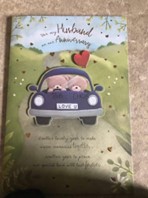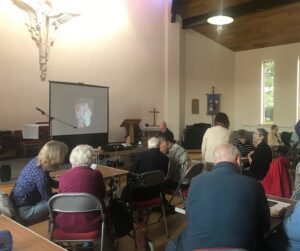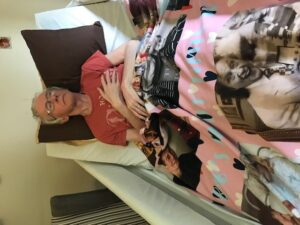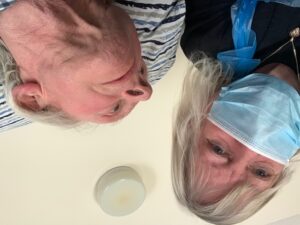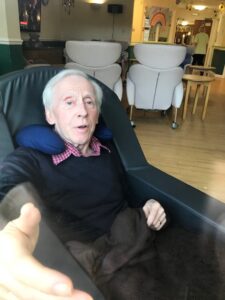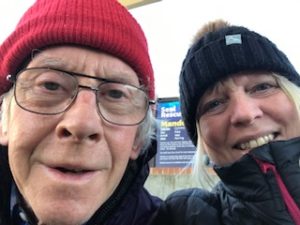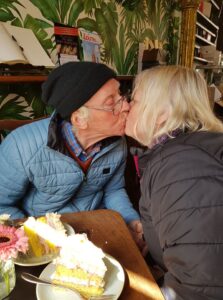Today, as I do three times a week, I visited my lovely husband Bob who has been in care since 10th March 2020 with the devastating illness Alzheimer’s.
It is amazing that he is still with us as he was not expected to live beyond last Christmas 2021 – according to our local GP who saw him after the first bout of Covid 19.
He is poorly there is no doubting that. He cannot walk or do anything for himself, even holding a chocolate button or a birthday card is beyond his cognition now. Recently it was our 43rd wedding anniversary. I took him a card that had a picture of two teddies in a car, I thought he might understand. Probably not.
However, he tries hard to communicate with me, chitter chattering nonsensical words, turning his head, looking at me directly and smiling. The love is still there for me and I see it in his eyes and mannerisms, and occasionally he speaks a phrase that makes sense, or he tries to sit up and puts his lips together for a kiss. For my part I still have him. I can kiss him and hold his hand. I can tell him my news and ring our sons and they talk to him when they can. He says ‘ Hello’ and he kisses the phone. I know he recognises their voices. They are wonderfully kind and patient but also brave and full of humanity. I am proud of the way they handle it all.
Today he is sat up in a Stirling chair (nice and deep and tipped slightly backwards so he can’t fall forwards), dressed nicely, shaved and clean, looking at the TV. He likes Tipping Point as he likes the bit where the coins drop down, and as he was brilliant with numbers in his past life he will read out the amounts the contestants win. Then it is The Chase. I tell him he is on my team and I try to answer the questions and he watches the red writing turn to green writing if I get it right.
The carers are kind and I know they make more effort when I come in. I insist they get him up as he likes to sit upright in a chair and I think is is better for his digestion. No one wants to lay in bed all day and he is not any different.
I take him the food we enjoyed together. He knows it. He looks for the red carrier bag with pictures of Parisian cartoons on we bought together in Paris. I like to think it evokes some happy memories of our time together. That and the food. Maybe somewhere deep inside him he’ll associate the food with me. Sometimes I get a positive clue that this is the case. But in any case I am satisfied that he is enjoying the food and relishing every mouthful. He eats everything we would normally eat, apart from chewy meat or stringy chicken as he doesn’t like the texture. Or the sloppy food which is sometimes given by the home. I feed him from a teaspoon as he opens his mouth a little. He is used to a beaker and the home gives him fortified drinks to keep his weight up.
It takes a little while to get him going with a spoon, but once he gets the taste of the food he opens his mouth wide and as he has all his own teeth he chews well and swallows fine. Today it is Lincolnshire sausages, two chopped, onion gravy, parsnips and broccoli and mash. Then chopped mince pies and extra thick cream blobs. It only takes me 30 mins and the swallowing is interspersed with ‘ lovely’. I have had a little victory with the food situation.
I couldn’t understand why he was on a semi-soft diet when he ate my food so magnificently. Once he pouched his food in one cheek with me and also with a carer but that was because he didn’t like the chewiness the stringy consistency but he never did it again. Not enough evidence I thought for giving him the sloppy soft diet daily that he clearly didn’t enjoy. I asked for a speech and language Dysphagia assessment as if these professionals thought the same then I would agree with it. However, Bob did not meet the criteria for a dysphagia assessment so therefore I reasoned he could still eat the chopped normal food. That is now supposed to happen whether I’m present or not! Bob also has a beer, or some wine and on Sundays a tot of port. Everything I would normally give him at home. Why not?
After this nutrition he will often say something. ‘ Are you alright for money?’ or ‘Be careful’ or sadly ‘ Let’s go home’
I play a range of our favourite music and music videos I’ve downloaded onto my iPad for him to watch. He loves these. I show him ELO Mr Blue Sky, Telephone Line, Wild West Hero and several Beatles black and white films with music tracks. I have a great playlist now and Bob enjoys it. I see the light switch on behind his eyes and his fingers and toes twitch. He becomes relaxed and content. I know it makes a difference. It makes him feel better and it is good for his well being. I don’t like to think of him on his own laid in bed with limited interaction. But I know the carers are busy, and Bob is easier to manage in bed as many residents can walk and are more difficult to keep occupied and safe. But all residents need to have their well being addressed and music is game changing.
Emotionally for me it is a roller coaster. I hate to see him struggling to communicate getting frustrated, pulling at his hair, trying to explain. ‘It’s horrible!’ he says. I hate it when he says ‘Let’s go together’ or ‘Is it time to go home?’
I still look forward to seeing him and he is always in my mind even though I try to fill my life with being busy. I have my Inner Wheel and Rotary endeavours to take part in. I volunteer at a local school weekly and have a wide range of friends to see regularly. I dread a phone call from the care home in case it is some bad news and my stomach lurches when I see who is ringing me on the phone. Sleeping all night is difficult as Bob comes back to me in the middle of the night. I have tried to get on with my own things in the day but at night he is in my unconscious brain. I remember the little things we did together, often long forgotten. I am probably more anxious as Bob smoothed out all my worries. He was a good match for me.
It almost makes me cry nowadays, when he tells me ‘You’re lovely’ or ‘ I’m sorry’. I tell him everything is fine and not to worry and that he’s lovely too. He sometimes is sad and downcast and I have a job to get him to respond to me but he usually does in the end.
Sadly he doesn’t know I’m his wife but thinks I’m his best friend.
That is ok we are best friends.

